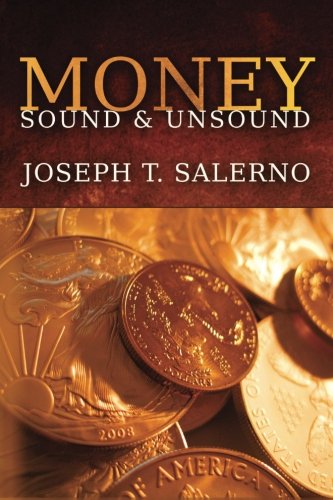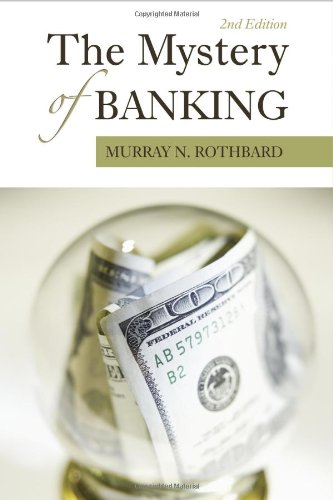Donald Trump and Kamala Harris differ on many issues. But their belief in authoritarian entitlement to control the lives of us peons? Eh…not so much.
Trump has recently touted his belief in protective tariffs as an important component of his “economic plan for America”; predictably, many clueless “conservatives” like Sean Hannity gushed about Trump’s supposed brilliance. This week Trump was interviewed by Bloomberg News on economic issues. Two notable excerpts from that interview:
 Money: Sound and Unsound
Best Price: $20.00
Buy New $21.43
(as of 03:59 UTC - Details)
Money: Sound and Unsound
Best Price: $20.00
Buy New $21.43
(as of 03:59 UTC - Details)
Excerpt 1: Tariffs [see here]:
Interviewer: “Tariffs also have another side…You could be plunging America into the biggest trade war since Smoot-Hawley.”
Trump: “But there are no tariffs.”
Interviewer: “There are tariffs already.”
Trump: “No, there are no tariffs; all you have to do is build your plant in the United States and you don’t have any tariffs.”
(Trump’s last comment refers to his recent threat to add a 200 percent tariff to John Deere tractors if they move their production to Mexico.)
Excerpt 2: The Fed and Interest Rates [see here]:
Trump: “As a very good businessman…I think I have the right to say, ‘I think you should go up or down a little bit. I don’t think I should be allowed to order it, but I think I have the right to put in comments as to whether or not interest rates should go up or down.”
Well then! Here are a few questions for Trump that no doubt spring to the minds of anyone who has not recently been hit on the head with a shovel:
- Can you please provide proof that you have the moral right and capability of “put[ting] in comments” on what the price of borrowing money should be? Do you also think you have the right to influence the prices of hammers or sour cream or toe socks?
- For that matter, given the dreadful record of the Fed (Motto: “We’re close to FEMA in the dictionary and in efficiency!”), what makes you think that any government agency should influence the cost of anything?
- Are you aware that the Constitution allows only Congress to impose tariffs? And only for the purpose of providing for “the common Defence and general Welfare of the United States”? And if so, do you plan to blatantly violate that law? Or can you at least point to the constitutional clause that says, “Tariffs may be added to a single private company if it does something the President dislikes”? Finally, what other powers reserved for Congress do you think the President can grab whenever he wants?
- Had you ever heard of the Smoot-Hawley Tariff before that interview? Did you know that it was a disastrous economic policy that added tariffs to more than 20,000 items and plunged America more deeply into the Great Depression? One can visualize the conversation between then-President Herbert Hoover and a top advisor:
Advisor: This depression is terrible; the people are suffering; what should we do?
Hoover: Let’s make thousands of goods more expensive for them.
Advisor: Great idea!
On the other hand, to his credit, Trump does give many indications of being a relatively decent guy. He also appears to really love America, and he did some admirable things during his first term, such as standing up to some of the demented one-world-government ghouls who want to crush humanity. (Too bad he didn’t see the obvious COVID con game for what it was, though; he still apparently doesn’t.)
But his arrogant authoritarian bent falls somewhere between troublesome and disturbing. And of course, it’s the kind of repellent personality trait Democrat-fascists and his other enemies love to jump on, pretending to take the moral high ground, while gushing crocodile tears of anxiety that Trump will “weaponize the government” and “politicize the judicial system” (as they cheer when the DOJ does the same to him). But why give these true enemies of goodness any ammo…unless you truly believe in your own ability/moral right to run the economy? Speaking of this autocratic mentality, in The Wealth of Nations, Adam Smith notes this:
The statesman who should attempt to direct private people in what manner they ought to employ their capitals [what they should buy, sell, and invest in], would…assume an authority which could safely be trusted, not only to no single person, but to no council or senate whatever, and which would nowhere be so dangerous as in the hands of a man who had folly and presumption enough to fancy himself fit to exercise it.
That is, Smith notes that any bureaucrat who believes that he’s smart enough to decide for millions of individuals or business owners how they should act economically is actually borderline crazy and therefore would be the absolute last person anybody should trust to try to “run the economy.”
Does Trump really believe that he has the right to punish the John Deere company for doing something it believes is in its best interest? Can’t he see that it’s very likely that burdensome regulations and excessive taxes played a crucial role in the company’s plans to move to Mexico?
If Trump were such a brilliant leader and businessman, why wouldn’t he instead push for getting rid of the types of regulations that infuriate and thwart business owners? Is “Just do what I say, or I’ll [unconstitutionally, despotically] punish you” the best Trump can come up with? What are his principles? And if Kamala Harris unconstitutionally orders Business X to do this or that, is that wrong? Then why isn’t it wrong to some Trump supporters if he does the same thing?
Here’s an idea, instead, for an announcement Trump could make on the day he wins the election:
 The Mystery of Banking
Best Price: $2.23
Buy New $7.57
(as of 07:55 UTC - Details)
The Mystery of Banking
Best Price: $2.23
Buy New $7.57
(as of 07:55 UTC - Details)
My Fellow Americans:
On Day 1 as President, I will pardon every single person convicted of violating any unconstitutional laws [here direct listeners to a website list of those laws]. These laws are not powers granted to the U. S. government and are therefore illegal. I will also pardon everybody in the future who is charged with violating any of these laws.
For too long, the competitiveness of great American industries like John Deere has been hamstrung with draconian, unconstitutional alphabet-soup-agency dictates. No more! We Americans have a tradition of innovation, individuality, and production, and without these burdens, we will compete with any nation on earth.
Millions of other companies and individuals would also benefit from this. And the time might be ripe: the great Alex Newman recently detailed how many state governments are pushing back against oppressive edicts that the U. S. government and its globalist minions have subjugated the people with.
In his 1849 essay The Law, Frederic Bastiat shows that it’s nearly impossible to use the law to fight socialism. Why? Because it’s the law itself that sets up that same system of socialism and protects it! In the same way, it’s a real head-scratcher to hear someone like Trump say he’s going to rid the nation of the baneful effects of unconstitutional government oppression…by using unconstitutional government oppression.




